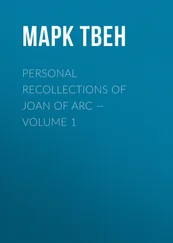Mark Twain - Personal Recollections of Joan of Arc — Volume 1
Здесь есть возможность читать онлайн «Mark Twain - Personal Recollections of Joan of Arc — Volume 1» весь текст электронной книги совершенно бесплатно (целиком полную версию без сокращений). В некоторых случаях можно слушать аудио, скачать через торрент в формате fb2 и присутствует краткое содержание. Год выпуска: 2004, Жанр: Историческая проза, на английском языке. Описание произведения, (предисловие) а так же отзывы посетителей доступны на портале библиотеки ЛибКат.
- Название:Personal Recollections of Joan of Arc — Volume 1
- Автор:
- Жанр:
- Год:2004
- ISBN:нет данных
- Рейтинг книги:5 / 5. Голосов: 1
-
Избранное:Добавить в избранное
- Отзывы:
-
Ваша оценка:
- 100
- 1
- 2
- 3
- 4
- 5
Personal Recollections of Joan of Arc — Volume 1: краткое содержание, описание и аннотация
Предлагаем к чтению аннотацию, описание, краткое содержание или предисловие (зависит от того, что написал сам автор книги «Personal Recollections of Joan of Arc — Volume 1»). Если вы не нашли необходимую информацию о книге — напишите в комментариях, мы постараемся отыскать её.
Personal Recollections of Joan of Arc — Volume 1 — читать онлайн бесплатно полную книгу (весь текст) целиком
Ниже представлен текст книги, разбитый по страницам. Система сохранения места последней прочитанной страницы, позволяет с удобством читать онлайн бесплатно книгу «Personal Recollections of Joan of Arc — Volume 1», без необходимости каждый раз заново искать на чём Вы остановились. Поставьте закладку, и сможете в любой момент перейти на страницу, на которой закончили чтение.
Интервал:
Закладка:
Chapter 13
The Third Trial Fails
SO THE SECOND trial in the prison was over. Over, and no definite result. The character of it I have described to you. It was baser in one particular than the previous one; for this time the charges had not been communicated to Joan, therefore she had been obliged to fight in the dark.
There was no opportunity to do any thinking beforehand; there was no foreseeing what traps might be set, and no way to prepare for them. Truly it was a shabby advantage to take of a girl situated as this one was. One day, during the course of it, an able lawyer of Normandy, Maetre Lohier, happened to be in Rouen, and I will give you his opinion of that trial, so that you may see that I have been honest with you, and that my partisanship has not made me deceive you as to its unfair and illegal character. Cauchon showed Lohier the proces and asked his opinion about the trial. Now this was the opinion which he gave to Cauchon. He said that the whole thing was null and void; for these reasons: 1, because the trial was secret, and full freedom of speech and action on the part of those present not possible; 2, because the trial touched the honor of the King of France, yet he was not summoned to defend himself, nor any one appointed to represent him; 3, because the charges against the prisoner were not communicated to her; 4, because the accused, although young and simple, had been forced to defend her cause without help of counsel, notwithstanding she had so much at stake.
Did that please Bishop Cauchon? It did not. He burst out upon Lohier with the most savage cursings, and swore he would have him drowned. Lohier escaped from Rouen and got out of France with all speed, and so saved his life.
Well, as I have said, the second trial was over, without definite result. But Cauchon did not give up. He could trump up another. And still another and another, if necessary. He had the half-promise of an enormous prize—the Archbishopric of Rouen—if he should succeed in burning the body and damning to hell the soul of this young girl who had never done him any harm; and such a prize as that, to a man like the Bishop of Beauvais, was worth the burning and damning of fifty harmless girls, let alone one.
So he set to work again straight off next day; and with high confidence, too, intimating with brutal cheerfulness that he should succeed this time. It took him and the other scavengers nine days to dig matter enough out of Joan's testimony and their own inventions to build up the new mass of charges. And it was a formidable mass indeed, for it numbered sixty-six articles.
This huge document was carried to the castle the next day, March 27th; and there, before a dozen carefully selected judges, the new trial was begun.
Opinions were taken, and the tribunal decided that Joan should hear the articles read this time.
Maybe that was on account of Lohier's remark upon that head; or maybe it was hoped that the reading would kill the prisoner with fatigue—for, as it turned out, this reading occupied several days. It was also decided that Joan should be required to answer squarely to every article, and that if she refused she should be considered convicted. You see, Cauchon was managing to narrow her chances more and more all the time; he was drawing the toils closer and closer.
Joan was brought in, and the Bishop of Beauvais opened with a speech to her which ought to have made even himself blush, so laden it was with hypocrisy and lies. He said that this court was composed of holy and pious churchmen whose hearts were full of benevolence and compassion toward her, and that they had no wish to hurt her body, but only a desire to instruct her and lead her into the way of truth and salvation.
Why, this man was born a devil; now think of his describing himself and those hardened slaves of his in such language as that.
And yet, worse was to come. For now having in mind another of Lovier's hints, he had the cold effrontery to make to Joan a proposition which, I think, will surprise you when you hear it. He said that this court, recognizing her untaught estate and her inability to deal with the complex and difficult matters which were about to be considered, had determined, out of their pity and their mercifulness, to allow her to choose one or more persons out of their own number to help her with counsel and advice!
Think of that—a court made up of Loyseleur and his breed of reptiles. It was granting leave to a lamb to ask help of a wolf. Joan looked up to see if he was serious, and perceiving that he was at least pretending to be, she declined, of course.
The Bishop was not expecting any other reply. He had made a show of fairness and could have it entered on the minutes, therefore he was satisfied.
Then he commanded Joan to answer straitly to every accusation; and threatened to cut her off from the Church if she failed to do that or delayed her answers beyond a given length of time.
Yes, he was narrowing her chances down, step by step.
Thomas de Courcelles began the reading of that interminable document, article by article. Joan answered to each article in its turn; sometimes merely denying its truth, sometimes by saying her answer would be found in the records of the previous trials.
What a strange document that was, and what an exhibition and exposure of the heart of man, the one creature authorized to boast that he is made in the image of God. To know Joan of Arc was to know one who was wholly noble, pure, truthful, brave, compassionate, generous, pious, unselfish, modest, blameless as the very flowers in the fields—a nature fine and beautiful, a character supremely great. To know her from that document would be to know her as the exact reverse of all that. Nothing that she was appears in it, everything that she was not appears there in detail.
Consider some of the things it charges against her, and remember who it is it is speaking of. It calls her a sorceress, a false prophet, an invoker and companion of evil spirits, a dealer in magic, a person ignorant of the Catholic faith, a schismatic; she is sacrilegious, an idolater, an apostate, a blasphemer of God and His saints, scandalous, seditious, a disturber of the peace; she incites men to war, and to the spilling of human blood; she discards the decencies and proprieties of her sex, irreverently assuming the dress of a man and the vocation of a soldier; she beguiles both princes and people; she usurps divine honors, and has caused herself to be adored and venerated, offering her hands and her vestments to be kissed.
There it is—every fact of her life distorted, perverted, reversed. As a child she had loved the fairies, she had spoken a pitying word for them when they were banished from their home, she had played under their tree and around their fountain—hence she was a comrade of evil spirits.
She had lifted France out of the mud and moved her to strike for freedom, and led her to victory after victory—hence she was a disturber of the peace—as indeed she was, and a provoker of war—as indeed she was again! and France will be proud of it and grateful for it for many a century to come. And she had been adored—as if she could help that, poor thing, or was in any way to blame for it. The cowed veteran and the wavering recruit had drunk the spirit of war from her eyes and touched her sword with theirs and moved forward invincible—hence she was a sorceress.
And so the document went on, detail by detail, turning these waters of life to poison, this gold to dross, these proofs of a noble and beautiful life to evidences of a foul and odious one.
Of course, the sixty-six articles were just a rehash of the things which had come up in the course of the previous trials, so I will touch upon this new trial but lightly. In fact, Joan went but little into detail herself, usually merely saying, "That is not true—passez outre"; or, "I have answered that before—let the clerk read it in his record," or saying some other brief thing.
Читать дальшеИнтервал:
Закладка:
Похожие книги на «Personal Recollections of Joan of Arc — Volume 1»
Представляем Вашему вниманию похожие книги на «Personal Recollections of Joan of Arc — Volume 1» списком для выбора. Мы отобрали схожую по названию и смыслу литературу в надежде предоставить читателям больше вариантов отыскать новые, интересные, ещё непрочитанные произведения.
Обсуждение, отзывы о книге «Personal Recollections of Joan of Arc — Volume 1» и просто собственные мнения читателей. Оставьте ваши комментарии, напишите, что Вы думаете о произведении, его смысле или главных героях. Укажите что конкретно понравилось, а что нет, и почему Вы так считаете.












